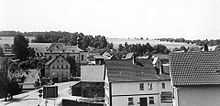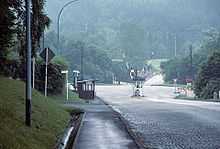Wildflecken
| Wildflecken | ||
|---|---|---|
| ||
 Wildflecken | ||
Location of Wildflecken within Bad Kissingen district  | ||
| Coordinates: 50°22′N 09°55′E / 50.367°N 9.917°ECoordinates: 50°22′N 09°55′E / 50.367°N 9.917°E | ||
| Country | Germany | |
| State | Bavaria | |
| Admin. region | Unterfranken | |
| District | Bad Kissingen | |
| Government | ||
| • Mayor | Alfred Schrenck (SPD/FW) | |
| Area | ||
| • Total | 77.56 km2 (29.95 sq mi) | |
| Elevation | 516 m (1,693 ft) | |
| Population (2012-12-31)[1] | ||
| • Total | 3,052 | |
| • Density | 39/km2 (100/sq mi) | |
| Time zone | CET/CEST (UTC+1/+2) | |
| Postal codes | 97772 | |
| Dialling codes | 09745 | |
| Vehicle registration | KG | |
| Website | www.wildflecken.de | |
Wildflecken is a municipality in the Bad Kissingen district, at the border of northwestern Bavaria and southern Hesse. In 2005, its population was 3,285; the postal code is 97772 (APO NY 09026). Wildflecken is in the picturesque Rhön hills and nature-park.

In 1937 the German Army established a large training area in the Rhoen area. Northeast of the village a camp, large enough to house about 9,000 soldiers and 1,500 horses was built. The camp (Camp Wildflecken) and training-area was primarily used by the German Army (Wehrmacht) as well as by the Waffen-SS. During the war several Wehrmacht and Waffen-SS divisions were activated and trained for combat in Wildflecken. Also located in Wildflecken were an ammunition factory and two POW camps, one for Russian POWs and one for POWs of Belgian and French origin.
In 1945 elements of the U.S. 14th Armored Division took control of the camp and the training area in April 1945.
From April 1945 to 1951, the base was a displaced persons camp housing approximately 20,000 displaced persons (DPs), primarily Poles, operated first by UNRRA, then by IRO. A Polish cemetery holds the camp's residents who died during those five years.
After 1951, its range served as a US Army training base operated by the 7th Army Training Command in Grafenwöhr,and it was home station for several U.S.Army units to include Armored, Infantry (Mech), Military Intelligence and logistical units, primarily the 373d AIB of the 19th (later 4th) Armored Group. It also served as a base for Bundesgrenschutz (border police) units and later for the new German Army (Bundeswehr).
Called "The Top of the Rock" the small post was among the most feared and disliked of all training areas due to high altitude and extreme weather conditions. The post was home to tank ranges and artillery ranges in addition to standard training ranging. Additionally, it was one of only a few training sites allowed by the German government to utilize CS gas in training.
US Units Stationed at Wildflecken:
- 2/15th Inf.Bn
- 1/68th Armor BN
- 1/1 Air Defense Artillery BN (I-Hawk). Only Headquarters & Headquarters Battery (HHB), Service Battery and B Battery were stationed at Wildflecken. A Battery was located in Bad Kissingen, and C Battery in Fulda. The unit's mission was to provide air defense against a potential East Block attack of Germany during the Cold War using Improved-Hawk missiles.
- 108th Military Intelligence BN
- 54th Combat Engineer BN
- 144th Ordnance Company
- 2/11th ACR. In early 1992, the 2nd Squadron, 11th Armored Cavalry Regiment, moved from Daley Barracks in Bad Kissingen to Wildflecken, where it remained until the deactivation of the unit (sometime between 15 October 1993 and 15 March 1994[2]).
The Wildflecken Kaserne was decommissioned by the U.S.Army and transferred to the Bundeswehr in 1994 after a drawdown that began in 1991.


Currently, it is home of the German Army "Warfighters Simulation Center", the training area is primarily used by the German Infantry School.
References
- ↑ "Fortschreibung des Bevölkerungsstandes". Bayerisches Landesamt für Statistik und Datenverarbeitung (in German). 31 December 2012.
- ↑ History of the 11th Armored Cavalry Regiment
External links
- The History of Camp Wildflecken
- A history of the Displaced-Persons camp in Wildflecken
- Wildflecken Veterans Association website
- 54th Engineer Battalion
| |||||||
